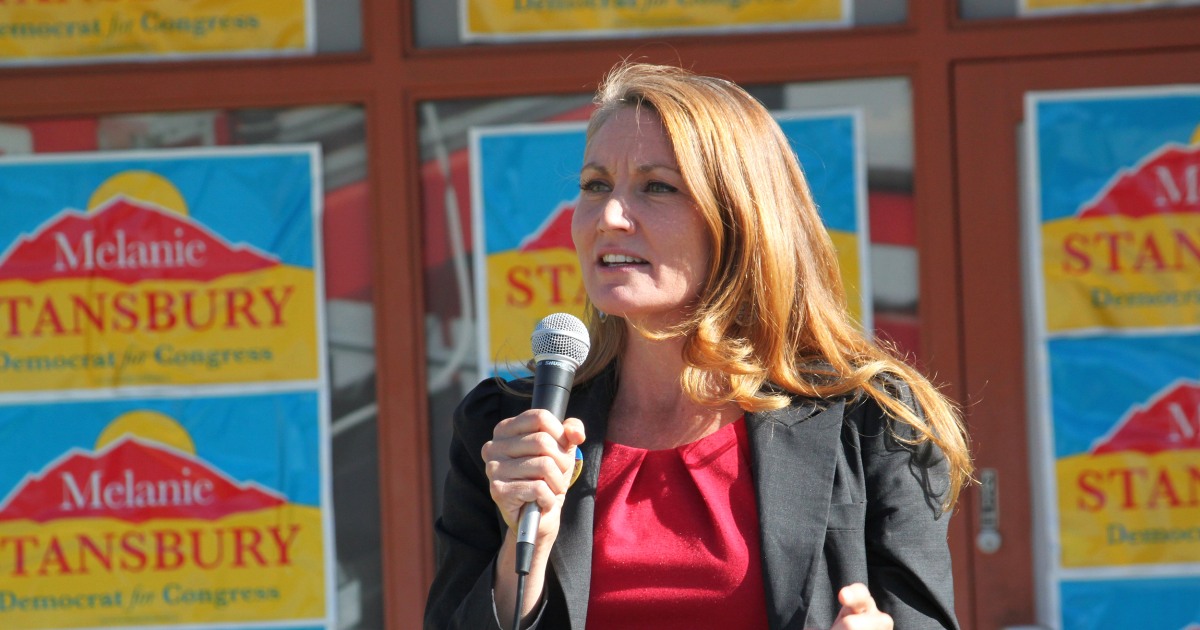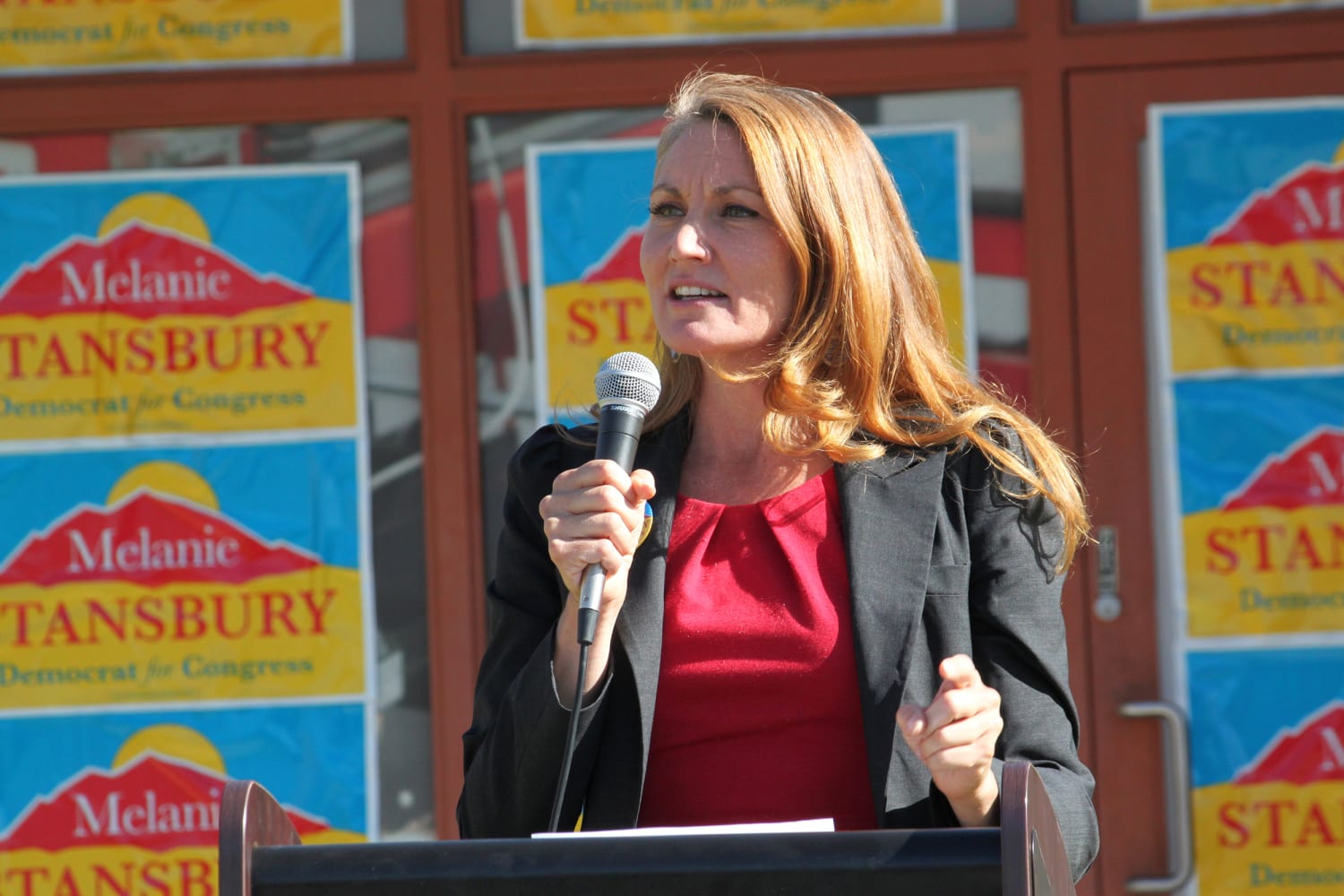
WASHINGTON — With 100 percent of the vote in, Democrat Melanie Stansbury defeated Republican Mark Moores Tuesday by 24 points in New Mexico’s special congressional election, 60 percent to 36 percent.
That’s higher than President Biden’s 23-point victory over Donald Trump in the congressional district last year, and higher than former Rep. Deb Haaland’s, D-N.M., 16-point margin when she won re-election. (Haaland is now Biden’s Interior secretary, and her resignation from Congress triggered Tuesday’s special election in New Mexico’s First Congressional District.)
While this is just one special election, and while Dems got shut out from the runoff in the 23-candidate field in the recent free-for-all in a Texas special House election, maybe the biggest takeaway from last night is just how unchanged the overall political environment is from last November.
“This looks like the type of special election result [you] would expect given a national environment that is basically unchanged from last year (i.e. one that still favors the Dems),” CNN’s Harry Enten tweeted.
You can also see this in Biden’s overall approval rating, which consistently hovers between 50 and 54 percent — essentially matching the 51 percent of the popular vote Biden won in November.
And at least for now, it makes sense: When Biden remains the avatar for Democrats and when Donald Trump remains the avatar for Republicans, you’re simply going to replay the 2020 election.
So if Republicans are going to maximize midterms gains next year, they’ve got to make Biden unpopular — and drive down that approval rating below his 2020 popular-vote percentage.
But right now, they’re barely even trying to fundraise off Biden, as Gabriel Debenedetti writes.
Biden meets with Capito
Speaking of things remaining unchanged, President Biden today meets at the White House with Sen. Shelley Moore Capito, R-W.V., where the story appears to be stuck on “Groundhog Day.”
Do Biden and the Democrats try to forge a bipartisan deal on infrastructure?
Or — recognizing that to be futile in the current political environment — do they go alone?
The question we still don’t have an answer for: What is the minimum Biden is willing to accept from a GOP counteroffer?
Senate Republicans seems to think it’s something close to $1 trillion. But as we also found out before the Memorial Day holiday, Dems want new money, not recycled money from the Covid-19 relief bill.
Data Download: The numbers you need to know today
One-fifth: The share of the daily U.S. cattle harvest held by producer JBS, which was forced to shut down nine beef plants in the U.S. on Tuesday after a ransomware attack.
At least 20: The number of Republican senators who did not meet with the family of the late Officer Brian Sicknick, per the Washington Post.
$15.9 million: How much Virginia GOP gubernatorial nominee Glenn Youngkin has raised so far.
33,457,338: The number of confirmed cases of coronavirus in the United States, per the most recent data from NBC News and health officials. (That’s 24,894 more than yesterday morning.)
598,985: The number of deaths in the United States from the virus so far, per the most recent data from NBC News. (That’s 672 more than yesterday morning.)
296,404,240: The number of vaccine doses administered in the U.S.
37.7 percent: The share of all Americans who are fully vaccinated, per NBC News.
51.7 percent: The share of all American adults over 18 who are fully vaccinated, per CDC.
Tweet of the day
Talking policy with Benjy: The racial wealth gap
On Tuesday, President Biden marked the 100th anniversary of the Tulsa massacre, in which a white mob murdered hundreds of Black residents and destroyed the city’s Greenwood neighborhood.
The deadly attack on a prosperous business district known as “Black Wall Street” has come to symbolize the racial wealth gap that persists to this day. Discrimination in business, housing, education — along with brutal violence at times — all played a role in making it harder for Black families to accumulate assets over the last century and pass them onto the next generation. The median white household now holds about eight times as much wealth as the median Black household, according to the Federal Reserve. Eliminating the racial wealth gap was a major topic in the 2020 Democratic primaries.
The White House announced a series of measures aimed at closing the racial wealth gap on Tuesday, including directing more government contracts to disadvantaged business owners and awarding new grants to help undo housing and transportation policies that have historically punished Black neighborhoods.
One policy the White House has not endorsed, but that’s still worth keeping an eye on: Baby bonds.
Popularized by economists Darrick Hamilton and William Darity Jr., it’s a race-neutral proposal to tackle historic wealth inequality by awarding all children a “baby bond” at birth that grows each year until adulthood, when it could be used for personal investments like college tuition, buying a home, or starting a business. In Washington, its most prominent champion is Sen. Cory Booker, D-N.J., who sponsors a bill that would start the bonds at $1,000 per child and then add as much as $2,000 per year depending on family income. The idea is that Americans of all races from poorer households would get a bigger payout just as they start their career.
Booker’s bill enjoys backing from Majority Leader Chuck Schumer but didn’t make it into Biden’s economic plans, which instead included an expanded child tax credit. With an estimated cost of $60 billion per year, it would take a major commitment to pass.
There are signs it’s catching on outside Washington, however. One of the New York City mayoral candidates, former HUD Secretary Shaun Donovan, is running on a version of the idea. New Jersey Governor Phil Murphy has also spoken in support of the concept and elected officials in Connecticut and the District of Columbia are exploring versions as well.
Primary opponents pile on McAuliffe in final debate
In their previous debate, Terry McAuliffe’s primary opponents barely laid a hand on the former Virginia governor.
But in their fourth and final debate ahead of next week’s Democratic primary in Virginia’s gubernatorial race, the field didn’t hold back against the frontrunner.
State Sen. Jennifer McClellan argued that McAuliffe wouldn’t inspire Dem voters to the polls. “It’s not enough to give someone something to vote against,” McClellan said, per the AP.
Former state Del. Jennifer Carroll Foy highlighted her life story versus McAuliffe and the other candidates. “Most of us have legislative successes, but I have the lived experience – working multiple minimum wage jobs just to get by, being unable to afford the high cost of healthcare, living in communities that have been redlined,” she said.
And Lt. Gov. Justin Fairfax said this: “When African Americans are shut out of opportunities repeatedly it sends a signal to people about what our system truly values and who truly has the opportunity to succeed in our society.”
For his part, McAuliffe focused his fire on GOP nominee Glenn Youngkin, calling him an “extreme right-wing Republican” and loyalist to Trump, the AP adds.
ICYMI: What else is happening in the world
Biden says his administration will “fight like heck” against restrictive voting efforts led by the GOP.
Biden is suspending oil-drilling leases in Alaska’s Arctic refuge.
The Trump administration’s “remain in Mexico” policy is officially ended.
Trump’s company will try to sell the lease for his D.C. hotel — again.
Here’s what to know about the anti-Netanyahu governing coalition poised to take over in Israel.
The New York Times profiles Deb Haaland.
Beto O’Rourke is hitting the road in Texas as speculation about a gubernatorial run mounts.
POLITICO writes that Cory Booker is wielding a new kind of power in the Senate.
Source: | This article originally belongs to Nbcnews.com










